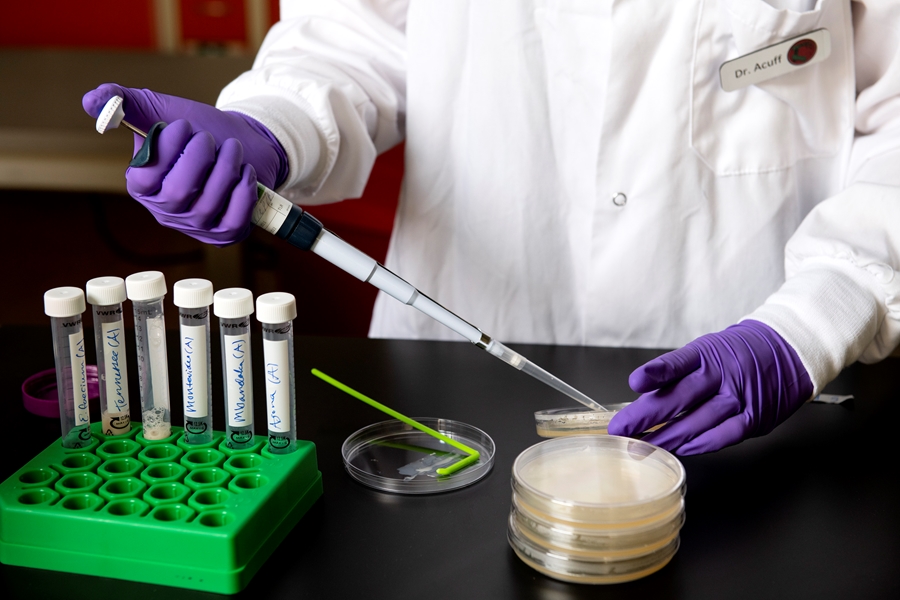
The first Fellows of the Future of Food: Opportunities and Careers for Undergraduate Students (F2OCUS) Fellowship Program were recently chosen by program directors to participate in a 10-week summer program with the Arkansas Agricultural Experiment Station.
Food science researchers with the Arkansas Agricultural Experiment Station, the research arm of the U of A System Division of Agriculture, secured a $730,000 grant from the U.S. Department of Agriculture's National Institute of Food and Agriculture this year to conduct the Research and Extension Experience for Undergraduates program for the next five years.
The program aims to increase understanding of food supply safety, quality and security for undergraduates in complementary degree programs, including biology, chemistry, consumer sciences and agricultural studies.
"We are excited to have the first cohort of F2OCUS fellows join us in Food Science for 10 weeks this summer," said Kristen Gibson, F2OCUS Fellowship Program director, professor of food safety and microbiology and director of the Center for Food Safety. "We successfully recruited a diverse group of Fellows from a variety of disciplines complementary to the field of food science. This diversity will undoubtedly bring excitement and an innovative spirit to the research and extension components of the F2OCUS program."
The program participants are:
- Natalie Blake, a plant science and animal science student at Southern Arkansas University in Magnolia
- Addie Gerstner, a biology student at the U of A
- Maya Henderson, a biochemistry and chemistry student at the U of A
- Sarkis Kalajyan, a chemistry and psychology student at the U of A
- Derek Mullins, a physics student at the U of A
- Luke Norman, a horticulture student at Texas A&M University in College Station, Texas
- Amanda Stuber, a culinary student at Northwest Arkansas Community College and the U of A Food Science Department
As F2OCUS Fellows, the undergraduates will be provided with room and board, a $4,800 stipend and travel support.
Food science research at the Arkansas Agricultural Experiment Station covers a wide gamut, Gibson said. Some examples of potential research projects for F2OCUS fellows include food ink development for 3D-printed food products, alternative protein sources to treat and prevent chronic diseases, nanoscale food-grade materials, new techniques to control harmful grain molds and mycotoxins, ways to cut down on foodborne pathogens in low-moisture foods and researching issues that affect rice quality.
Undergraduates who are not enrolled in a food science program were chosen to spend the summer in Fayetteville, Gibson said. Fellows will work with faculty mentors on research projects before showcasing their work at an end-of-program symposium.
Along with Gibson, fellowship project directors include food science faculty members Jennifer Acuff, assistant professor of food safety and microbiology, and Jamie Baum, associate professor of nutrition. Jill Rucker, associate professor of agricultural education, communications and technology for the Dale Bumpers College of Agricultural, Food and Life Sciences at the U of A, is also a project director and faculty mentor.
In addition to the four project directors, 10 collaborating mentors with extensive mentoring experience have been chosen to assist with the fellowship program. Industry partners, many of whom are U of A alumni and serve as adjunct faculty, will also participate in the fellowship program.
The fellowship program will also work closely with the Ozark section of the Institute of Food Technologists, whose members represent all areas of the local food industry, from packaging and manufacturing to research and development.
While scientific research is a significant part of the fellowship, there is also a heavy emphasis on team building, leadership development and communication skills.
"Communication of scientific research to stakeholders and the general public is a critical skill to develop," Gibson said. "One cannot just restate the data and expect everyone to understand how to use it. As researchers, we must provide guidance on how the data can be used and translated into practice for real-world application."
To learn more about the program and apply, visit future-food-reeu.uada.edu.
To learn more about Division of Agriculture research, visit the Arkansas Agricultural Experiment Station website: aaes.uada.edu. Follow us on Twitter at @ArkAgResearch.
To learn about Extension Programs in Arkansas, contact your local Cooperative Extension Service agent or visit uaex.uada.edu. Follow us on Twitter at @AR_Extension.
To learn more about the Division of Agriculture, visit uada.edu. Follow us on Twitter at @AgInArk.
About the Division of Agriculture: The University of Arkansas System Division of Agriculture's mission is to strengthen agriculture, communities, and families by connecting trusted research to the adoption of best practices. Through the Agricultural Experiment Station and the Cooperative Extension Service, the Division of Agriculture conducts research and extension work within the nation's historic land grant education system. The Division of Agriculture is one of 20 entities within the University of Arkansas System. It has offices in all 75 counties in Arkansas and faculty on five system campuses. The University of Arkansas System Division of Agriculture offers all its Extension and Research programs and services without regard to race, color, sex, gender identity, sexual orientation, national origin, religion, age, disability, marital or veteran status, genetic information, or any other legally protected status, and is an Affirmative Action/Equal Opportunity Employer.
Topics
- Agriculture
- Research & Innovation
- Science
- Appointments
- Academic Affairs
- Dale Bumpers College of Agricultural, Food & Life Sciences
- Fulbright College of Arts & Sciences
- Department of Biological Sciences
- Department of Chemistry and Biochemistry
- Department of Food Science
- Department of Horticulture
- Plant Science Program
- Department of Psychological Science
- Department of Physics
Contacts
John Lovett, project/program specialist
Agricultural Communication Services
479-763-5929,